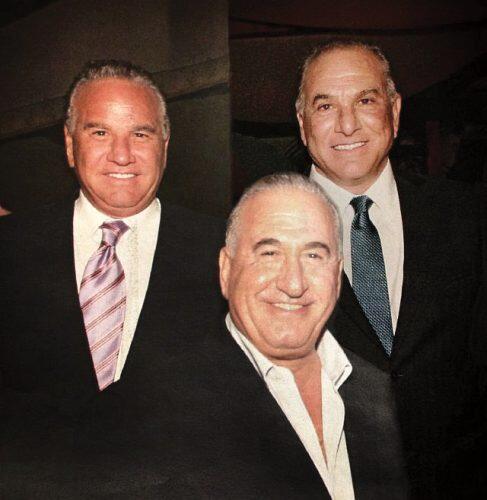Trending
Bittersweet tenant: Sugar Factory owner sues Nakash over Ocean Drive lease
An entity led by Las Vegas restaurateur Charissa Davidovici claims unlawful eviction in nearly $1M rent dispute in Miami Beach

In a tenant-landlord dispute laden with sugar and spite, a candy-themed chain restaurant operator is accusing Nakash Holdings of engaging in an unlawful eviction in Miami Beach.
In a countersuit filed last month in Miami-Dade Circuit Court, ILov305 accuses a Nakash affiliate of attempting to collect nearly $1 million in rent payments that are allegedly not owed, and engaging in other questionable business practices. In September, the Nakash affiliate sued to evict ILov305 from its 5,838-square-foot commercial space in The Strand at 1052 and 1060 Ocean Drive.
ILov305 is an entity managed by Sugar Factory founder and Las Vegas restaurateur Charissa Davidovici. The company leases the Ocean Drive space that previously housed iLov305 Steakhouse, an establishment that initially included Miami’s global pop star Pitbull, real name Armando Perez, as a partner. In 2019, the restaurant briefly rebranded as El Dorado Cantina, but was converted into a Sugar Factory location last year after the candy-themed chain restaurant was kicked out of another Nakash-owned Ocean Drive property.
Alan Reiss, an attorney representing Nakash Holdings, declined comment. Lawyers for ILov305 did not respond to requests for comment.

Ralph, Avi and Joe Nakash
New York-based Nakash Holdings is a global conglomerate run by brothers Joe, Avi and Ralph Nakash, founders of the Jordache Jeans fashion brand. In addition to The Strand commercial space, Nakash Holdings owns four hotels and the former Versace mansion on Ocean Drive, as well as The Setai Miami Beach hotel at 2001 Collins Avenue.
According to Nakash’s eviction lawsuit, ILov305 failed to kick in a percentage of its gross sales as additional rent from May through August. The percentage amount allegedly owed is $406,383. That triggered a default notice that included a demand for payment of $548,717 in deferred rent during the months the restaurant was closed due to business shutdowns during the onset of the pandemic, according to the eviction lawsuit.
ILov305’s current minimum monthly rent is $78,231, including common area maintenance, the lawsuit shows.
In its countersuit, ILov305 claims it does not owe the percentage of sales rent because the restaurant has not reached a threshold of $9.1 million in gross sales, per the lease agreement. Nakash claims the threshold was reduced to $4.8 million when it granted ILov305 deferred rent payments.
ILov305 alleges Nakash is attempting to collect more rent than is actually owed by falsely claiming the company is in default of the lease. The restaurant operator alleges that the rent dispute is part of a pattern of questionable business practices by Nakash and its representatives.
For instance, the lawsuit alleges that Salem Mounayyer, an employee of Nakash Holdings, demanded the previous tenant, Ocean Drive Food Court, sublet a portion of the commercial space to a friend who wanted to operate a food and beverage establishment with its own liquor license, separate and apart from the food court, and at a lower rental rate than other vendors.
When Ocean Drive Food Court refused, Mounayyer allegedly “made every conceivable effort” to stymie and sabotage the food court project. The food court tenant subsequently learned that Mounayyer was going to own a stake in his friend’s business, ILov305’s lawsuit alleges.
To avoid a protracted dispute, Ocean Drive Food Court turned over the lease to ILov305 in 2017. Nakash approved the transfer because ILov305 agreed to include Mounayyer as an investor with Mounayyer putting in $125,000, the complaint alleges. But Mounayyer allegedly refused to make subsequent capital calls that ILov305 initiated, forcing other investors to cover the shortfalls.
When the steakhouse was not profitable, Mounayyer allegedly pressured ILov305’s manager to credit his initial $150,000 investment toward the purchase of an unrelated doughnut business, the complaint states.
Related entities of ILov305 had also rented the restaurant space at Hotel Victor that housed Sugar Factory’s previous Ocean Drive location, according to the complaint. Nakash and Mounayyer demanded that Sugar Factory offer a discount program for Hotel Victor employees and offer breakfast and room service for hotel guests, the lawsuit alleges.
Nakash would allegedly refuse to timely pay the allocated costs for the employee meals and allegedly never reimbursed Sugar Factory for silverware and plates hotel staff discarded instead of returning them to the kitchen, the complaint states.
The landlord then “manufactured a pretextual default” by claiming Sugar Factory had not paid late fees that the Nakashes failed to collect in more than two years, according to the lawsuit. To avoid legal fees in a protracted legal battle, Sugar Factory agreed to vacate Hotel Victor.
In its motion to dismiss ILov305’s lawsuit, Nakash accuses the restaurant operator of engaging in an “irrelevant tirade” and “frivolous assault” to defame Mounayyer.
“Clearly the complaint was drafted to intentionally defame non-parties while ostensibly hiding behind litigation privilege,” the motion states. “No court should tolerate this nonsense…It is all immaterial, irrelevant scandalous fodder.”




